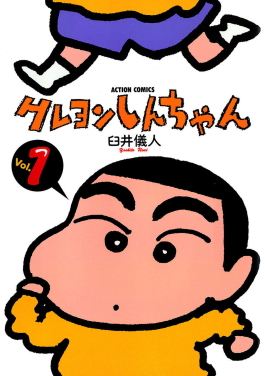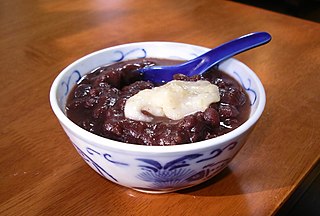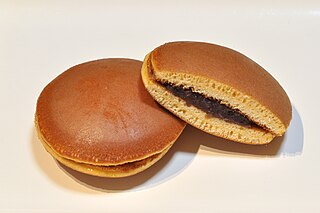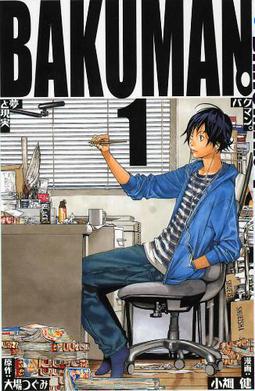Azuki may refer to:
Azuki may refer to:
Midori is the Japanese word for "green" and may refer to:

Crayon Shin-chan is a Japanese manga series written and illustrated by Yoshito Usui. Crayon Shin-chan made its first appearance in 1990 in a Japanese weekly magazine called Weekly Manga Action, which was published by Futabasha. Due to the death of author Yoshito Usui, the manga in its original form ended on September 11, 2009. A new manga began in the summer of 2010 by members of Usui's team, titled New Crayon Shin-chan.
Hana as a given name may have any of several origins. It is also a version of a Hebrew name from the root ḥ-n-n meaning "favour" or "grace", a Kurdish name meaning hope (هانا), a Persian name meaning flower (حَنا) and an Arabic name meaning "bliss" (هَناء). As a Japanese name, it is usually translated as flower (花). In Korean, it means the number one (하나). In Hawaiian, "Hana" means "craft" or "work". In Maori, "Hana" means to shine, glow, give out love or radiance. In Albanian, "Hana" means the moon.

Shiruko, or oshiruko (お汁粉) with the honorific o (お), is a traditional Japanese dessert. It is a sweet porridge of azuki beans boiled and crushed, served in a bowl with mochi. There are different styles of shiruko, such as shiruko with candied chestnuts, or with glutinous rice flour dumplings instead of mochi.

Shōdoshima or Shōdo Island is an island located in the Inland Sea of Japan. The name means "Island of Small Beans". There are two towns on the island: Tonoshō and Shōdoshima, composing the district of Shōzu.
Miho is a feminine Japanese given name. It can have many different meanings in Japanese depending on the kanji used.

Dorayaki is a type of Japanese confection. It consists of two small pancake-like patties made from castella wrapped around a filling of sweet azuki bean paste.

Azuki-chan is a manga series about a young schoolgirl named Azusa Noyama, nicknamed Azuki-chan because when she was in first grade, Ken Takayanagi, a boy in her class, accidentally reads her name, "Azusa(あずさ)", as "Azuki(あずき)". Originally serialized in Nakayoshi magazine, later adapted into anime by Madhouse.
Shun'ichi Yukimuro is a Japanese screenwriter for anime television series. Yukimuro has had a career spanning four decades and written over 3,000 anime television series scenarios, including episodes of many classic series produced by the Toei Animation studio.

Cinnamoroll is a character series created by Sanrio in 2001, with character designs from Miyuki Okumura. The main character, Cinnamoroll, is a white puppy with chubby and pink cheeks, long ears, blue eyes, and a tail that resembles a Cinnamon roll. He starred in his own manga series, an anime movie, and various animation shorts.
Aizawa is a Japanese surname. Alternate writings include 相澤, 藍澤 and 藍沢. Notable people with the surname include:

Haruhi Suzumiya is a Japanese light novel series written by Nagaru Tanigawa and illustrated by Noizi Ito. It was first published in 2003 by Kadokawa Shoten in Japan with the novel The Melancholy of Haruhi Suzumiya, and has since been followed by 11 additional novel volumes, an anime television series adaptation produced by Kyoto Animation, four manga series, an animated film, two original net animation series and several video games.
Shizuku means "droplet". It may refer to:

Sakura is a common feminine Japanese given name which can also be used as a surname.

Bakuman is a Japanese manga series written by Tsugumi Ohba and illustrated by Takeshi Obata, the same creative team responsible for Death Note. It was serialized in Shueisha's shōnen manga magazine Weekly Shōnen Jump from August 2008 to April 2012, with its 176 chapters collected into 20 tankōbon volumes. The story follows talented artist Moritaka Mashiro and aspiring writer Akito Takagi, two ninth grade boys who wish to become manga artists, with Mashiro as the illustrator and Takagi as the writer. Some characters resemble real authors and editors of Weekly Shōnen Jump, and many manga titles mentioned in Bakuman have actually been published in the magazine.
Nanami is a rather popular feminine Japanese given name which is also used as a surname.

The Embalmer is a manga series written and illustrated by Mitsukazu Mihara. It was serialized within the magazine Feel Young, and was collected into 7 volumes by Shodensha. The Embalmer was previously licensed for English release by Tokyopop, and four volumes have been released. The company Hanami has released the complete series in Poland. A 12-episode live-action drama adaption called Shigeshōshi was produced and ran on TV Tokyo, Aichi Television Broadcasting, and TVQ Kyūshū; it was later released in a boxset by the company VAP. Two CDs containing music from the series were released in November 2007. A 6-episode WEB show was produced as a spin-off, originally released on the TV Tokyo web page for Shigeshōshi and later as part of the Shigeshōshi boxset.

The Disappearance of Nagato Yuki-chan, is a Japanese manga series written and illustrated by Puyo. The series is a spinoff of Nagaru Tanigawa's Haruhi Suzumiya light novel series, and is based on the alternate universe originally featured in the series' fourth volume and feature film, The Disappearance of Haruhi Suzumiya. The series was serialized in Kadokawa Shoten's Young Ace magazine from July 2009 to August 2016 and is licensed by Yen Press. A 16-episode anime television series adaptation by Satelight aired between April and July 2015, with an original video animation episode released in October 2015.

Ao-chan Can't Study! is a Japanese manga series written and illustrated by Ren Kawahara. The series was serialized in Kodansha's Shōnen Magazine Edge magazine from October 2015 to December 2018, and was compiled into eight tankōbon volumes. The manga is licensed in North America by Kodansha USA, who began releasing the manga digitally in English in September 2018. A sequel manga was launched in January 2019, and an anime television series adaptation by Silver Link aired from April 6 to June 22, 2019.

Azuki is a digital manga publishing and distribution service that aggregates English-translated manga legally from publishers such as Kodansha, Futabasha, Coamix, and Kaiten Books for reading online. Content is made available to read on the Azuki website, iOS app, or Android app through a single linked account, and readers may either subscribe monthly for access to thousands of chapters, or unlock manga volumes via individual purchases. Azuki also translates manga in-house and publishes series exclusive to its service such as Natsume & Natsume and Turning the Tables on the Seatmate Killer.